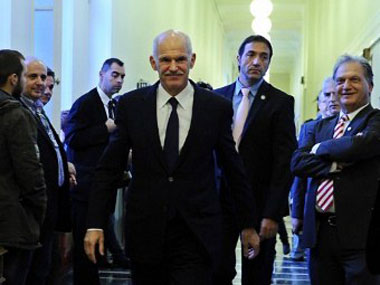ATHENS: Greek party leaders were struggling to agree on a new prime minister, under pressure from the European Union to push through a bailout to save the country’s finances and end the chaos threatening the euro. After early signs that agreement on a new national unity coalition could be reached quickly, the drive by the socialist and conservative parties to create a government that will rule only until February appeared to be losing momentum. Monday came and went without any accord on who will lead the coalition, despite former vice president of the European Central Bank, Lucas Papademos, emerging as a frontrunner. [caption id=“attachment_126023” align=“alignleft” width=“380” caption=“Prime Minister George Papandreou was forced to make way for a national unity coalition last week - Reuters”]  [/caption] “Today is the last chance for the two main parties,” centre-left daily Ta Nea wrote in an editorial. “They have to come up with a government strong enough to take the country out of the moving sand of political impasse that leaves us defenceless, at the mercy of the crisis. Time is up.” The cabinet will hold an emergency session today and officials said negotiations were under way on the “100-day coalition” which must win parliamentary approval for a euro zone bailout and save the country from bankruptcy. “A national unity government, right now,” Ethnos daily wrote on its front page. “The country and the society cannot endure anymore.” Frustration was also apparent in Brussels where officials said the new government had to show it was serious about implementing promises Athens has made to its EU and IMF lenders in return for the 130 billion-euro bailout. “It is essential that the entire political class is now restoring the confidence that had been lost in the Greek commitment to the EU/IMF programme,” said EU Economic and Monetary Affairs Commissioner Olli Rehn. Prime Minister George Papandreou caused chaos last week by calling a referendum on the bailout, a vote which would probably have rejected the package because of the austerity measures tied to it. Papandreou backed down, but was forced into agreeing to make way for the unity coalition. Weary of broken promises from Athens, Rehn said the coalition must “express a clear commitment on paper, in writing, to the EU/IMF programme”. The stakes could not be higher. Greece faces bankruptcy in December when big debt repayments are due, unless it can get hold of more emergency funding soon. For the euro zone, it is a question of credibility with international financial markets. For two years it has laboured to solve the problems of Greece, a very small part of the bloc’s economy, leading to doubts about how it would manage if the debt crisis engulfed the far bigger Italian or Spanish economies. What is now a regional crisis could hit the global economy if it goes unchecked, and the United States weighed in with a demand that Greece live up to its responsibilities. “We urge the government to move as quickly as possible to fulfil the commitments,” said White House press secretary Jay Carney. Greek party officials were tight-lipped about why the naming of the new prime minister, which had been expected on Monday, had not yet happened. Papademos remained a frontrunner for prime minister. An aide said the Greek economist, who left the ECB last year, had arrived in Athens on Monday from the United States where he is a Harvard academic. Papademos oversaw the nation’s adoption of the euro in 2002 as Bank of Greece governor before moving to the ECB, and is a well-known figure in European capitals. Some Greek media speculated that he was setting tough conditions, demanding greater powers than Papandreou or conservative leader Antonis Samaras were prepared to give. Reuters
After early signs that agreement on a new national unity coalition could be reached quickly, the drive by the socialist and conservative parties to create a government that will rule only until February appeared to be losing momentum.
Advertisement
End of Article
Written by FP Archives
see more


)
)
)
)
)
)
)
)
)



